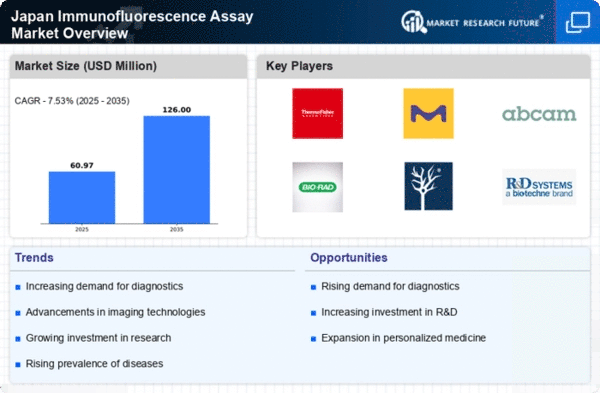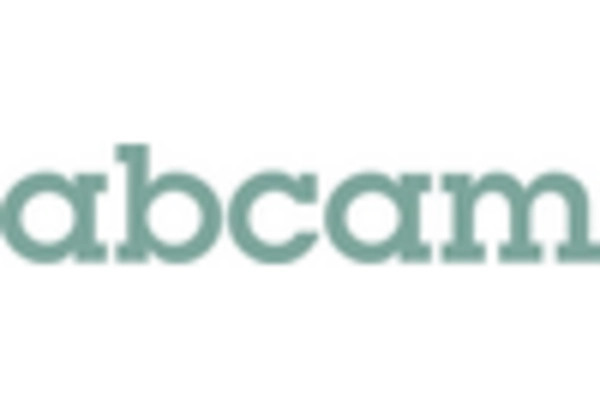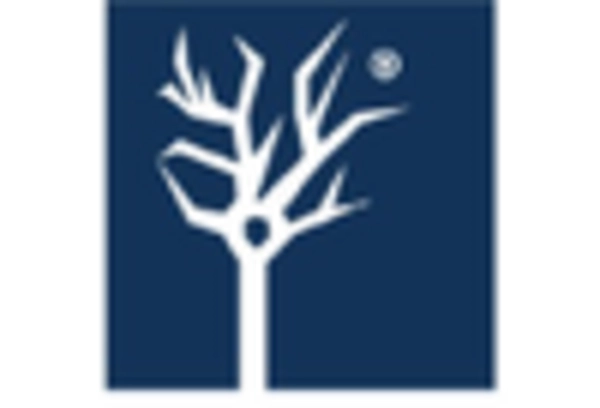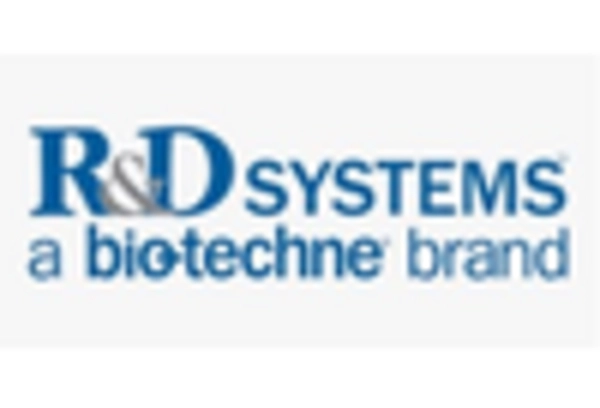Growing Research Activities
The immunofluorescence assay market in Japan is experiencing a surge in research activities, particularly in the fields of oncology and immunology. This increase is driven by the need for advanced diagnostic tools that can provide precise and rapid results. Research institutions and universities are investing heavily in developing novel immunofluorescence techniques, which are expected to enhance the accuracy of disease detection. According to recent data, the funding for biomedical research in Japan has increased by approximately 15% over the past year, indicating a robust interest in innovative diagnostic solutions. This trend is likely to propel the growth of the immunofluorescence assay market, as researchers seek to adopt these advanced methodologies for their studies.
Increased Investment in Biotechnology
Investment in biotechnology is a key driver for the immunofluorescence assay market in Japan. The government and private sector are channeling substantial funds into biotechnological research and development, fostering innovation in diagnostic tools. This financial support is crucial for the advancement of immunofluorescence techniques, enabling the development of more sensitive and specific assays. Recent reports suggest that biotechnology investments in Japan have grown by over 10% in the last year, reflecting a strong commitment to enhancing healthcare solutions. As a result, the immunofluorescence assay market is likely to benefit from this influx of capital, leading to the introduction of cutting-edge diagnostic products.
Rising Prevalence of Chronic Diseases
The prevalence of chronic diseases in Japan is on the rise, which is significantly impacting the immunofluorescence assay market. Conditions such as cancer, autoimmune disorders, and infectious diseases are becoming increasingly common, necessitating the development of effective diagnostic tools. The Japanese healthcare system is adapting to this trend by integrating advanced diagnostic technologies, including immunofluorescence assays, into routine clinical practice. Recent statistics indicate that cancer cases in Japan are projected to increase by 20% over the next decade, highlighting the urgent need for reliable diagnostic methods. This growing demand for accurate disease detection is expected to drive the expansion of the immunofluorescence assay market.
Technological Integration in Healthcare
The integration of advanced technologies in healthcare is transforming the immunofluorescence assay market. Innovations such as automation, artificial intelligence, and machine learning are being incorporated into diagnostic processes, enhancing the efficiency and accuracy of immunofluorescence assays. Japanese laboratories are increasingly adopting these technologies to streamline workflows and reduce human error. For instance, automated immunofluorescence systems can process multiple samples simultaneously, significantly increasing throughput. This technological shift is anticipated to boost the immunofluorescence assay market, as healthcare providers seek to improve diagnostic capabilities and patient outcomes.
Collaboration Between Academia and Industry
Collaboration between academic institutions and the biotechnology industry is fostering growth in the immunofluorescence assay market. These partnerships are essential for translating research findings into practical applications, particularly in the development of novel diagnostic assays. In Japan, numerous collaborations have emerged, focusing on leveraging academic expertise to enhance the capabilities of immunofluorescence techniques. Such alliances are expected to accelerate innovation and bring new products to market more efficiently. The synergy between academia and industry is likely to play a pivotal role in shaping the future of the immunofluorescence assay market, as it facilitates the exchange of knowledge and resources.
















